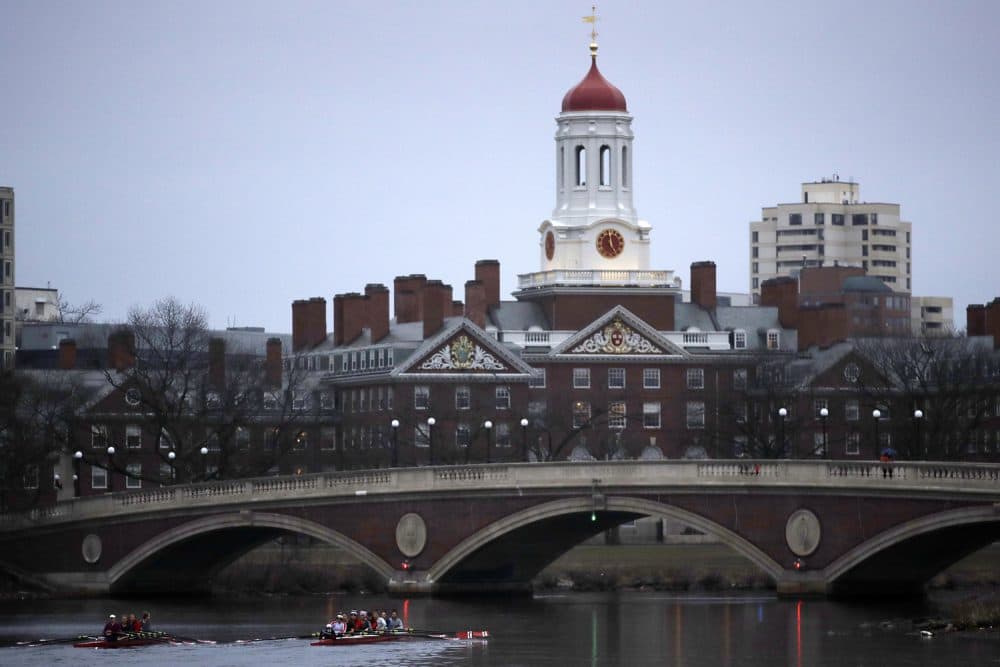Advertisement
Harvard's Admissions Are Biased Against Asian-Americans, Group Claims

New court documents in an ongoing case against Harvard University over fairness in its admissions practices shed light on some of the ways the school chooses its students.
The nonprofit Students for Fair Admissions, or SFFA, represents Asian-American students rejected by Harvard University, and filed a lawsuit in 2014 alleging the highly-selective Ivy has admissions processes that discriminate against Asian-American applicants.
The documents filed in Boston federal court Friday rely on an analysis by a Duke University economics professor, who looked at Harvard admissions data over six years. SFFA claims the research done by Peter Arcidiacono shows overwhelming evidence that Harvard's methods disproportionately harm Asian-American applicants.
It does so, SFFA says, by weighing candidates on several merits, some of which disadvantage Asian-American applicants. The group takes particular issue with how Harvard evaluates students for personality traits.
In its filings, the group says:
"Professor Arcidiacono found that ‘[a]n Asian-American applicant who was male, who was not disadvantaged, and whose characteristics result in a 25% chance of admission would have more than a 36% chance of admission if treated as a white applicant; more than a 75% chance of admission if treated as a Hispanic applicant; and more than a 95% chance of admission if treated as an African-American applicant (with all other characteristics unchanged).’ ”
"Unfortunately, I have been advised that I can't comment on the case until after trial," Arcidiacono told WBUR in an email Friday.
According to University of Michigan economics and education professor Susan Dynarski, Arcidiacono's analysis does not look at all the students who apply to Harvard.
“The plaintiffs' analysis leaves out a big chunk of the applicant pool,” Dynarski said in an interview. “They leave out legacies. They leave out athletes. They leave out children of faculty and staff.”
The filing cites reports by Harvard's Office of Institutional Research.
One draft report out of that office concluded that although low-income students receive a "tip," or advantage, in the admissions process, data show the "tip" for students with relatives who graduated from Harvard and for athletes is "larger."
Other Harvard internal investigations cited by the plaintiffs show that the only racial or ethnic group disadvantaged in admissions is Asian-Americans.
The court documents also provide insight into how Harvard scores applicants more generally.
Harvard scores applicants on a scale of 1 to 6, with 1 being the best, the filing shows. Admissions staff rate each applicant in four categories: 1. academic; 2. extracurricular; 3. athletic; 4. personal. They then also give each applicant an overall score.
The SFFA claims Harvard admissions officials assign Asian-Americans the lowest score of any racial group on the personal rating — a “subjective” assessment of applicants' character.
Under this assessment, SFFA, says, admissions officials are instructed to evaluate whether the student has a “positive personality,” and if “others like to be around him or her.” The criteria also asks if the student has “character traits” such as “likability … helpfulness, courage, [and] kindness,” and if the candidate is an “attractive person to be with,” “widely respected,” a “good person,” and equipped with good “human qualities.”
According to the documents, Harvard instructs readers to assign the score by “stepping back and taking all the factors into account and then assigning that overall rating.”
The brief from SFFA draws the conclusion that if "Harvard admitted students based only on their academic index, Asian-Americans would comprise over 50% of the admitted class."
SFFA's brief mentions the deposition of former Harvard employee Mark Hansen, who conducted data analysis of admissions, as evidence that Harvard's selection process is biased against Asian-American students.
The brief said:
"Hansen testified that the reports show that Asian-Americans 'are disadvantaged in the admissions process at Harvard.'
"And when asked: 'Do you have any explanation other than intentional discrimination for your conclusions regarding the negative association between Asians and the Harvard admissions process?'
"Hansen responded: 'I don’t.' ”
Hansen did not immediately respond to a request for comment.
Edward Blum, president of SFFA, declined to comment. The names of all of the plaintiffs have been permanently sealed.
Harvard spokesperson Anna Cowenhoven issued a statement on behalf of the university:
Thorough and comprehensive analysis of the data and evidence makes clear that Harvard College does not discriminate against applicants from any group, including Asian-Americans, whose rate of admission has grown 29% over the last decade. Mr. Blum and his organization’s incomplete and misleading data analysis paint a dangerously inaccurate picture of Harvard College’s whole-person admissions process by omitting critical data and information factors, such as personal essays and teacher recommendations, that directly counter his arguments.
This lawsuit is the continuation of a series of failed legal challenges to the consideration of race in higher education admissions orchestrated by Mr. Blum. Harvard will continue to vigorously defend our right, and that of other colleges and universities nationwide, to seek the educational benefits that come from a class that is diverse on multiple dimensions, from its capacity for academic excellence to its ability to help create a campus community that gives every student the opportunity to learn from peers with a wide variety of academic interests, perspectives, and talents.
Correction: Due to an editing error, the odds of being admitted to Harvard for an Asian-American candidate if the applicant were of a different racial background were previously inaccurate. The post has been updated. We regret the error.
This article was originally published on June 15, 2018.
